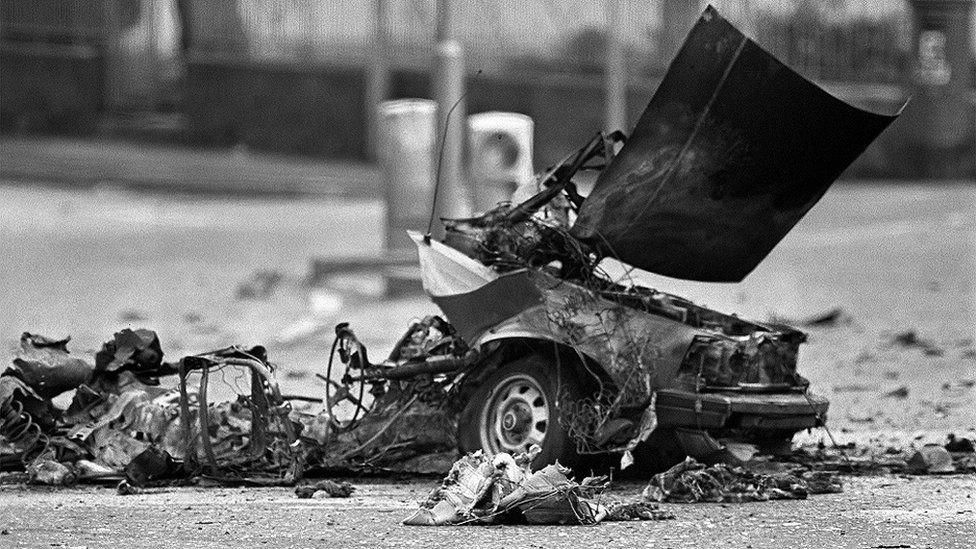Leo Varadkar's united Ireland comments 'unhelpful' says Heaton-Harris
- Published
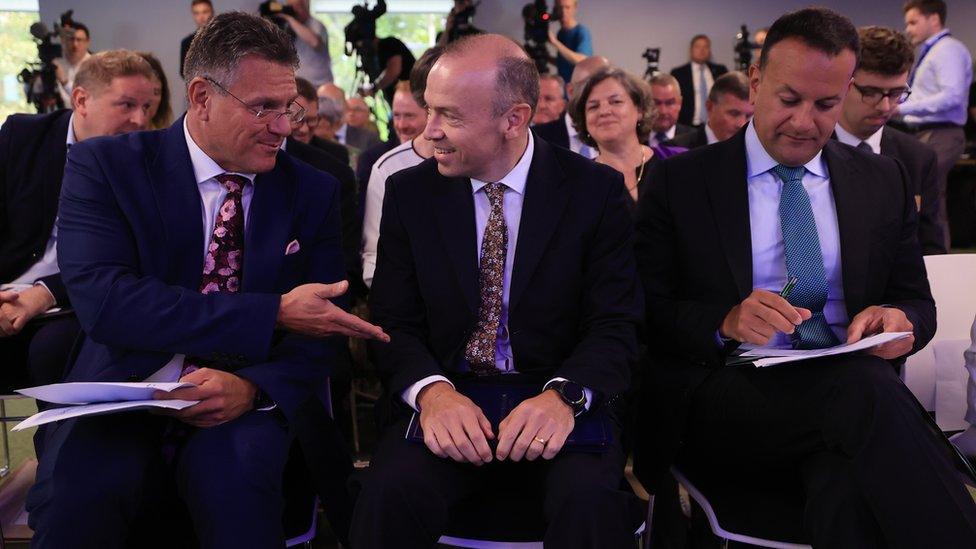
European Commission vice-president Maros Šefčovič, Secretary of State Chris Heaton-Harris and Taoiseach Leo Varadkar in Belfast on Monday
Leo Varadkar's comments about a united Ireland and a "plan B" to Stormont restoration were unhelpful, the Northern Ireland secretary has said.
Chris Heaton-Harris was speaking after holding talks with Taoiseach (Irish prime minister) at the launch of a new £858m funding scheme.
The Peace Plus initiative will fund projects in NI and border counties.
At the event in Belfast, Mr Heaton-Harris and Mr Varadkar discussed the restoration of power-sharing.
Northern Ireland's devolved government collapsed last year when the Democratic Unionist Party (DUP) withdrew in protest against post-Brexit trade barriers.
The DUP has said the Windsor Framework deal - struck by the EU and UK Government earlier this year to reform the Northern Ireland Protocol - does not go far enough to address its concerns.
'Down in Dublin'
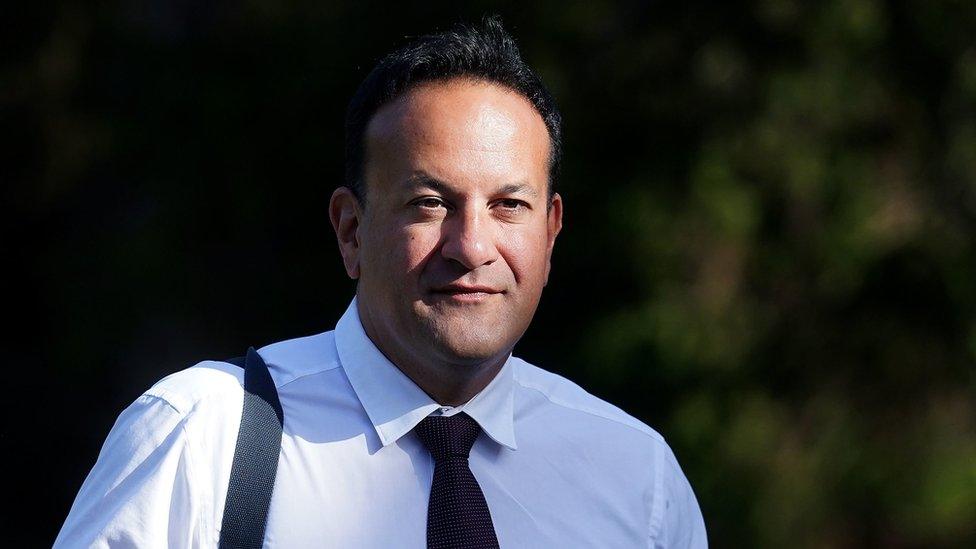
Taoiseach Leo Varadkar is in Belfast for the announcement of the funding
In August, Mr Varadkar said discussions about a "plan B" would be needed if the Stormont institutions were not restored.
Last week, he went on to say he thought he would see a united Ireland in his lifetime.
Mr Heaton-Harris reiterated that restoration talks with the DUP were progressing and appeared to criticise Mr Varadkar.
He added: "The taoiseach has got a lot of domestic politics on his plate but occasionally unhelpful comments down in Dublin do resonate up here amongst the unionist community.
"I need the clearest pitch possible to get the executive up and running.
"I'm keen the executive is up and running in the shortest period of time.
"Talk of a plan B is unhelpful because whatever is going on we need to be trying to get the executive up and running," he said.
An Irish government source described the meeting with Mr Heaton-Harris as constructive, but added that "there was some surprise when the secretary of state chose to make some comments in public that were not made in private".
'Snail's pace'
Last week Mr Heaton-Harris told MPs that talks to restore Stormont had "moved forward substantially".
Asked about this assessment, Mr Varadkar said: "I think if it's advancing at all, it's advancing at a snail's pace."
He added: "I did say to the secretary of state once again that there is going to come a point where we can't keep waiting and we have to start talking about alternative arrangements within the confines of the Good Friday Agreement."


Chris Heaton-Harris and Leo Varadkar met for about 15 minutes, in a private room away from Monday's main event.
Their subsequent separate press conferences made clear the men couldn't be further apart on the big issues they face.
On Stormont, Chris Heaton-Harris said last week that talks had moved forward "substantially", but Leo Varadkar said that "if they're progressing at all it's at a snail's pace".
On future plans if Stormont doesn't return, Mr Varadkar said: "We can't wait forever, we will need alternative arrangements."
Mr Heaton-Harris said "talk of a plan B is unhelpful".
On legacy, Mr Varadkar claimed he had "asked the UK government to pause the bill" but Mr Heaton-Harris said no pause had been asked for.
What began as a day all about cross-border cooperation has instead ended in another diplomatic row about the politics of Northern Ireland surfacing.

Mr Varadkar said he would have an opportunity to speak with Prime Minister Rishi Sunak about this in October.
He ruled out the idea of joint authority between the UK and Irish governments, saying that "joint authority isn't provided for in the Good Friday Agreement".
What is the Peace Plus scheme?
The politicians had gathered to launch the scheme in Belfast, which will deliver investment across six key themes designed to ensure the continued economic, social and environmental development of Northern Ireland.
The UK government is contributing £730m to the total allocation of Peace Plus.
Mr Varadkar said it "would make a big difference to people's lives".
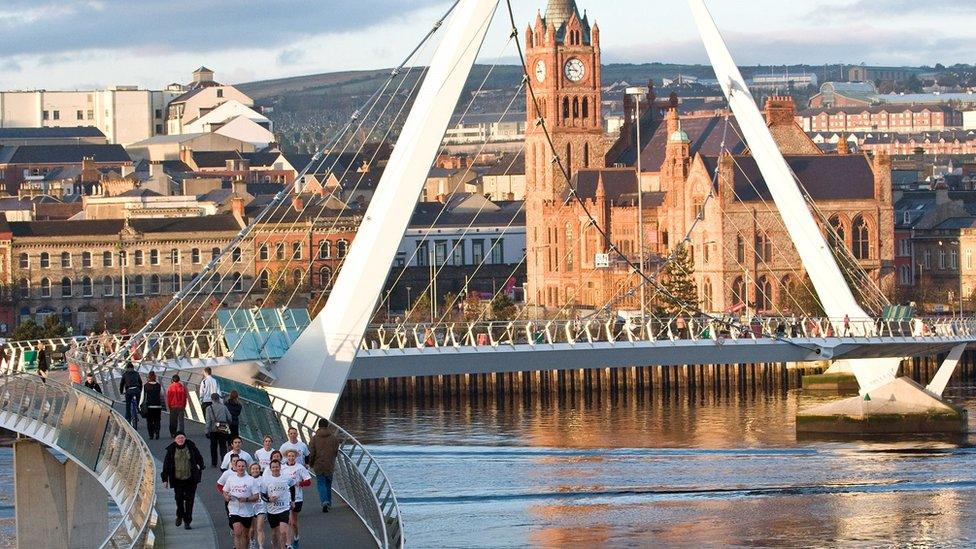
Londonderry's Peace Bridge is one of the major projects in Northern Ireland that EU funding helped to build
Some of the best known projects include the Peace Bridge over the River Foyle and the regeneration of the Girdwood Barracks in north Belfast.
The current scheme replaced a pre-Brexit peace scheme, which has been in operation since 1995.
It applies to Northern Ireland and the border counties of the Republic of Ireland - Donegal, Sligo, Leitrim, Cavan, Monaghan and Louth.
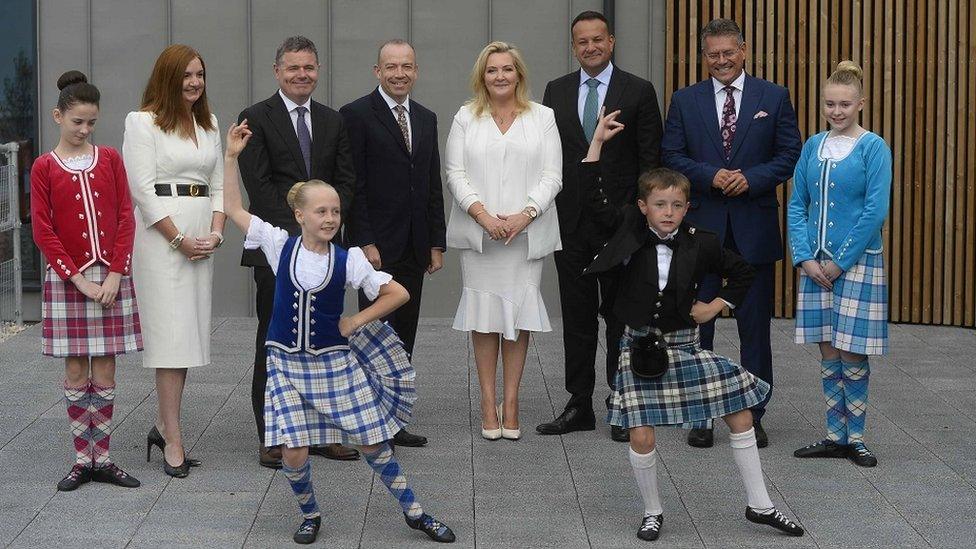
Irish, UK and EU leaders were treated to a highland dancing show at Monday's event
It is the successor to the Peace IV scheme, which focuses on children and young people, shared education, shared spaces and positive local relations.
'Concerns were expressed'
A small group of victims campaigners turned up at the launch of the scheme to protest against the UK government's controversial legacy bill.
It is due to pass its final hurdle in the Lords this week, despite opposition from political parties and victims' group.
Protesters held signs urging the Irish government to intervene to prevent the bill from taking effect.
It ends new Troubles-era cases and inquests and offers conditional amnesty to those accused of killings.
John Teggart, whose father Daniel was killed in what became known as the Ballymurphy massacre in 1971, said families were there to urge Mr Varadkar and the Irish government to "take and interstate case against the British government's disastrous Legacy Bill of shame".
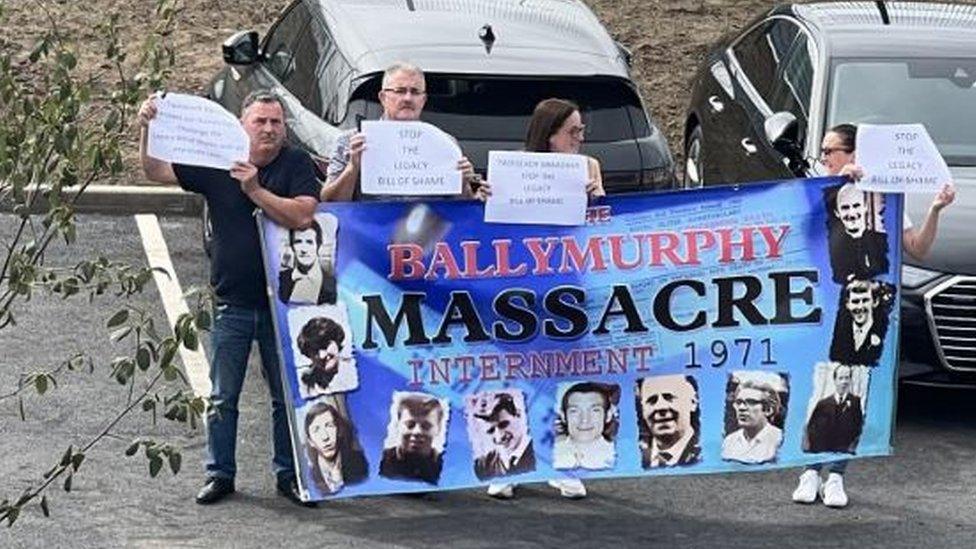
Campaigners staged a protest at the Peace Plus event
The Irish government previously said it would consider taking legal action against the UK over the legislation.
On Monday Mr Varadkar said a decision regarding a such case had not yet been made.
"Before we make a decision we need legal advice from the attorney general, which should come in the next few weeks," he added.
Mr Heaton-Harris said "concerns were expressed" by the Irish government about the proposed legislation.
"Obviously the Irish government is still unhappy with the bill," he added, but said he believed the legislation was "an honest and true attempt to get information" for families.
Related topics
- Published18 December 2020

- Published11 January 2019

- Published6 September 2023
